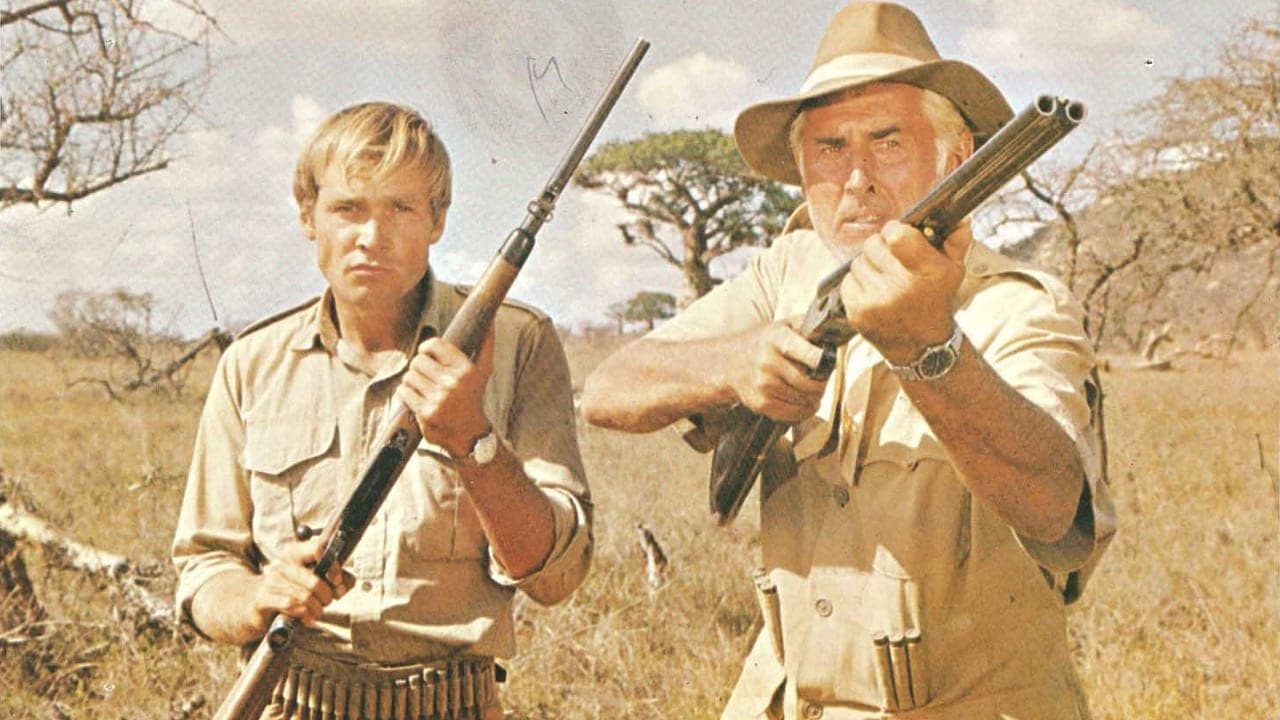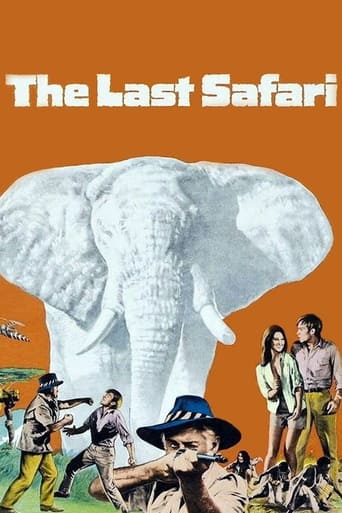

Save your money for something good and enjoyable
... View MoreIt's a mild crowd pleaser for people who are exhausted by blockbusters.
... View MoreIt was OK. I don't see why everyone loves it so much. It wasn't very smart or deep or well-directed.
... View MoreIt's the kind of movie you'll want to see a second time with someone who hasn't seen it yet, to remember what it was like to watch it for the first time.
... View MoreThis Henry Hathaway-directed jungle adventure was well past its sell-by date in 1967, and now plays like some bizarro parallel universe cinematic representation of Africa: even the baldly propagandistic South African films of the '70s and '80s were based in a firmer reality than The Last Safari! Stewart Granger plays Miles Gilchrist, an old-fashioned great white hunter bemoaning the arrival of snotty rich tourists who are sullying the sport of kings (shooting animals). The tourists are personified by Casey (charisma-free Kaz Garas), a crude and brash American who wants to go on a great adventure with Miles. Personality clashes ensue, but not before Casey plays chicken with a rhino and spends an evening in a night club listening to a very strange musical act, which seems to consist of Masai tribesmen playing a blend of western jazz and Afrobeat. At least their music is better than John Dankworth's miserably dull score. The only watchable element of this colonialist fantasy is beautiful Gabriella Licudi as the worldly young woman who accompanies Casey on his adventures.
... View MoreThis film was actually my introduction to Stewart Granger, an actor I've never really seen too much in other films (I just read the Wikipedia biography of him today, at least 40 years after I first saw this film!).While I've never actually seen all of this movie from the beginning, while growing up it came on enough times on television that I eventually saw at least 90% of it (if not more) -- more than enough to go beyond the basic plot, though I've never seen it straight through. It is not a masterpiece, but it is certainly less annoying that most of Hollywood's films regarding the "dark continent" throughout Hollywood's long history, which were (and are) almost all ridden with clichés' about it and her people, and which has rarely (until recently, say, as in LeCarre's "The Constant Gardener") come close to transcending a completely naive, Euro-centric mentality (unless it is going very self- consciously in the other direction, straining to be ridiculously in "awe" of the natives, straining all credibility). Instead, Granger neither depicts a man who live up to one's worst expectations of the "white hunter," nor is in a role where he must be as brave or good as Tarzan -- but is instead quite easy to love and respect, even if he's a bit grizzled and "rough around the edges." Hardly a "heroic" character in this, he is nonetheless far more believable -- cut down to a much more acceptable size than the usual, stereotypical white, European protagonist, whether good or evil.I personally think he does quite well in this role, and have always liked, above all, Granger's "natural" acting, despite being schooled on the stage - where there's always a need to exaggerate somewhat just to be noticed - before transitioning to film. I also always liked the basic theme in this movie (which is that he - an old and experienced hand at wild game hunting - meets a superficial playboy while on an African Safari who, despite his obnoxious - and rather hilarious pretensions - nonetheless is quite likable in his childishness, and thus ends up maturing toward the end of the film).One of the charms of this "old movie" is that this was filmed before Africa -and the world for the matter - had really started going completely, and utterly, to seed (as it has since), yet was made after Hollywood had begun to finally mature a little - at least enough to go beyond its former stereotypes. Those stereotypes were mainly two: 1) the old Tarzan & Jane stereotypes (with their endless battles with greedy white men in pith helmets and khaki clothes. Though very endearing, these films were just too simplistic beyond childhood). On the other extreme, Hollywood films often depicted Africa as a completely "savage" place with only "jungle bunnies" as her inhabitants (though, of course, this was never explicitly stated, being too obviously racist for "liberal" tinsel town), versus the always-more- enlightened "Euros." Rather, the relationships in this film are more realistic and natural than what you might expect.Yes, the scenery is beautiful, but not overdone. Most movies of Africa overdo the scenery bit. It is that Hollywood penchant for self- conscious, over-glorification of quite natural surroundings which instead of evoking appreciation, instead is often very annoying, as in "look at this!" and "look at that!" and "isn't this exotic!" or "isn't that lush and beautiful!" It is nice when filmmakers don't treat their audiences all like five year old kids, or go overboard showing what is left of our over-exploited earth. Most films of Africa that depict its beauty remind me of Robert Pirsig's comment in "Zen and the Art of Motorcycle Maintenance" about how Yellowstone got on his nerves. He explains how it was because it was just too obviously like a framed picture on the wall, saying, "look at me." That is . . . nature separated from the rest of the society rather than integrated into it (tree lined streets, for example, or large sturdy arbors with lush festooned vines over box-store parking lots, for example). There's nothing wrong with parks, of course, including Yellowstone, but let's also have more appreciation of nature in the rest of society rather than this endless pretense . . . Likewise, the Africans are depicted quite naturally, embodied especially in the actor playing Granger's helper/guide. He is neither depicted as an exceptional survivor of "the aftermath of colonial rule," nor as some sort of pathetic victim of white man's greed - (even though he meets a tragic end)- but simply as a professional (or semi professional) hunter's guide, and who could just as well been white (though he certainly is not an "oreo cookie" either (black on the outside, white on the inside. In other words, this was post Tarzan, post "King Kong" and post much else, thank god!I realize I might appear as overdoing to praise a bit (for indeed, this isn't, as I said, some lost, priceless masterpiece that will floor you), but it is unique. And it is the understated nature of this film that I like. It wasn't trying to be anything more than what it was. And even if Stewart Granger himself wasn't particularly proud of it, I still like it, and always will.
... View More...whose filmography includes such treasures as "lives of a Bengal Lancer" "Peter Ibbetson" " Niagara" ,the underrated "legend of the lost" and more.This one is anaemic,even Stewart Granger does not believe in what he is playing,being sullen,indifferent, barely infuriated by millionaire Casey's whims .The plot is a run of the mill confrontation experienced grumpy old hunter / young mindless rookie who wants to go with him on a safari(check the title).A bubble head girl accompanies the freshman :the prize goes to the scene when the young brunette realizes dancing with the natives can be dangerous .The beautiful African landscapes are nicely filmed but they do not really need these raiders of the lost elephant.
... View MoreAdapted from GILLIGAN'S LAST ELEPHANT, this is a somewhat-above-average adventure film, starring Stewart Granger in his familiar role as a white hunter. What makes the movie memorable is the character of Kaz Garas, a brash, wealthy American who just happens to be right about the direction Africa is (and should be) going, while Granger and all the other Noble White Hunters are dead wrong.
... View More